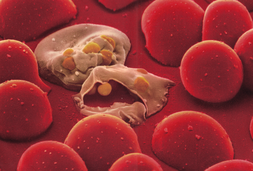Welcome to the Pepper Lab
|
The adaptive immune system is characterized by specificity, functional diversity and memory. These characteristics engender the body with the ability to mount a directed response against an individual pathogen for many years after vaccination, but also allows for the propagation of long-lived allergic responses. In the Pepper lab, we study how cells of the adaptive immune system, called CD4+ T cells and B cells, form immunological memory by visualizing their differentiation, retention and function in both mice and humans. We accomplish this by using novel tetramer-based enrichment strategies to study small populations of antigen specific CD4+ T and B cells in both complex infectious diseases such as malaria as well as during allergic asthma using a house dust mite model. We additionally use transgenic mice with various genetic ablations to interrogate the underlying molecular mechanisms involved in memory cell development and function. The overarching goals of these studies are to both enhance immune memory to design better vaccines and inversely block the formation of immune memory to prevent allergic disease. |


